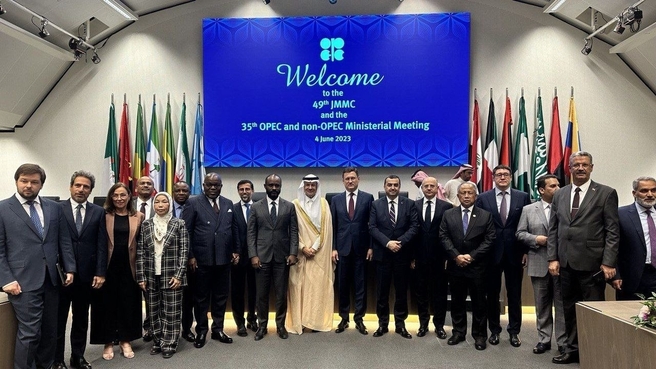
Deputy Prime Minister Alexander Novak co-chaired the 35th ministerial meeting of the OPEC and non-OPEC countries and the 49th meeting of the OPEC+ Joint Ministerial Monitoring Committee, according to the official website of RF Government.
The participating countries agreed to adjust oil production to 40.46 million barrels per day from 1 January to 31 December 2024. This decision is to secure long-term market benchmarks, maintain market stability, and create predictability in the long run. The parties confirmed the critical importance of full conformity to the deal’s terms and the need for countries exceeding their production quotas to pay compensation in keeping with a table accepted by the meeting participants in addition to the established oil production levels.
“Russia will adjust its oil production level to 9.828 million barrels per day (according to independent sources) and will additionally extend its voluntary reduction by 500,000 barrels per day until the end of December 2024 as a precaution in coordination with the OPEC+ member states, which announced a voluntary oil output cut in April. This is a voluntary step, but it will also depend on the required production level coordinated at the 35th OPEC+ ministerial meeting on 4 June 2023. The overall oil production cut by the OPEC+ countries until the end of 2024 will amount to 3.66 million barrels per day from the October 2022 level,” Deputy Prime Minister Alexander Novak said.
“The Kingdom of Saudi Arabia will additionally cut its oil production by 1 million barrels per day as a voluntary measure throughout July, which may be extended so that the Kingdom’s production level will reach 9 million barrels per day, whereas the overall voluntary reduction will make up 1.5 million barrels per day,” the Kingdom’s SPA Agency reported with reference to an official source in the Royal Energy Ministry.
Production cuts could also be implemented by Nigeria, Congo, and Angola following an independent audit by three companies (IHS, WoodMackenzie, and RystadEnergy) specialising in oil production evaluations. The aim is to identify country production capacities to be used to achieve control levels of output for 2025. The OPEC Secretariat will coordinate the evaluation effort, while maintaining independence of these three sources, the communiqué of the ministerial meeting in Vienna says. The adjustment has to be carried out until the end of 2023. Nigeria’s current oil production plan is 1.578 million barrels per day.
“We see a supply-and-demand balance in the international market, including thanks to the decisions adopted by OPEC+. Today, we are recording a rise in demand, especially in the summer period, due to a rise in flights. As for the terms of the production cut deal, they are being over-fulfilled. The terms of the voluntary agreement to cut production, which came into force in May 2023, are being implemented as well. Russia is meeting its obligations in full,” Alexander Novak said.
The next OPEC+ meeting is scheduled for 26 November in Vienna. Meetings of the OPEC+ monitoring committees will be held once every two months. In this context, the Joint Ministerial Monitoring Committee retains its power to hold additional meetings or request an OPEC+ ministerial meeting at any time to review changes in the market, when deemed fit.
On December 5, 2022, an embargo on maritime Russian oil shipments to the European Union came into force. G7 nations, the EU and Australia agreed on a price cap for Russian oil delivered by sea, setting the ceiling at $60 a barrel. Moreover, starting February 5, 2023, similar restrictions on deliveries of petroleum products from Russia were enforced as the EU Council officially greenlighted the decision, in conjunction with the G7, to introduce a price ceiling on Russian petroleum products supplied by sea at $100 for premium oil and at $45 for discount.
In February 2023, OPEC+ reaffirmed their commitment to the plan to reduce oil production by two million barrels per day, agreed upon following the meeting on 5 October 2022. Besides, Deputy Prime Minister Alexander Novak said in February that Russia would voluntarily reduce its oil production by 500 thousand barrels per day. Later he said that this decision would remain in force until end of June 2023.



